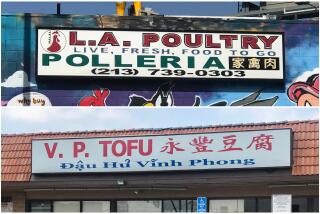Cheesesteak Joint Places Its Own Order: English Only
PHILADELPHIA — The sign contains just eight words and is hardly big enough to wrap around a cheesesteak. But here in South Philadelphia, home of the cheesesteak, the sign that Joey Vento posted at Geno’s Steaks speaks volumes.
It reads: “This Is America. When Ordering Please Speak English.”
Vento, whose Italian grandparents arrived in America unable to speak English, faces a discrimination complaint from the city’s Commission on Human Relations, which said the English-only sign may violate city laws.
At a time when illegal immigration has become a divisive national issue, the tiny sign above the bright orange tile at a local culinary institution has sharpened the debate in a neighborhood founded by Italian immigrants. Though some civic leaders are appalled, many Geno’s customers insist that everyone in America should speak English -- and express themselves freely.
“Hey, what happened to freedom of speech?” customer Al Buck asked Tuesday, clutching a hot cheesesteak and sporting a T-shirt with a red, white and blue message: “Welcome to America -- Now Speak English.”
Vento, 66, has said the sign is aimed at illegal immigrants in a community where the Mexican population has grown in recent years. He told the Associated Press on Monday that the sign would remain, even if the city fined him. “They would have to handcuff me and take me out because I’m not taking it down,” he said.
City Councilman James F. Kenney has called the sign “divisive and mean-spirited,” not to mention “bad for the neighborhood and bad for tourism.” The Philadelphia Convention and Visitors Bureau, concerned about the city’s image, reminded everyone that the city values immigrants’ “culture, vibrancy and history.”
A Philadelphia Inquirer editorial called Vento’s policies “boneheaded,” which may explain why he is no longer speaking to the newspaper, or any newspaper.
“The papers twisted his words,” said his son, Geno Vento, who was working the counter at lunchtime Tuesday.
Joey Vento was taking the day off, his son said, “resting his vocal cords” after a marathon round of TV interviews. Asked for a comment, Geno Vento replied, “This whole thing is getting out of hand.”
The Commission on Human Relations will determine whether the sign violates the city’s Fair Practices Act, said City Solicitor Romulo L. Diaz. If so, Diaz said, the city code calls for fines or imprisonment for failure to comply -- though the commission normally tries to resolve issues without sanctions.
The local ACLU chapter has staked out a middle ground. “Putting up a sign saying you need to speak English is protected speech,” said Mary Catherine Roper, an ACLU staff attorney in Philadelphia. But refusing service based on language or nationality would violate the law, she said.
Anthony Marconni, who was helping Geno Vento serve steaming cheesesteaks, said no customer had been turned away. “We serve everybody. We’re not discriminating against anybody,” Marconni said.
Back when Joey Vento was speaking to newspapers, he told the Inquirer that illegal Mexican immigrants had brought diseases and crime, and were a drain on hospitals and schools.
It’s “wrong, wrong, wrong that a Mexican girl comes here to pop a baby,” the paper quoted Vento as saying.
He added: “I say what everybody’s thinking but is afraid to say.”
Vento, who has “Geno’s Steaks” tattooed on his arm, has posted “Speak English” signs on his Hummer. According to the Inquirer, he has driven through South Philadelphia with a public-address system, chastising businesses that hire illegal immigrants.
Vento said the sign, which he posted about six months ago, was intended to improve communication. “If you can’t tell me what you want, I can’t serve you,” he said.
For the uninitiated, a cheesesteak is a cholesterol-delivery device consisting of grilled strips of beef, melted cheese, onions and peppers on an Italian roll.
It is sometimes difficult for outsiders to order at Geno’s or other local cheesesteak emporiums because of an unspoken code that requires ordering “wid” or “widout,” meaning with or without onions. (One newcomer once asked “Wid what?” and was told, “Wid cheese, stoopid!”) One must also specify the cheese -- Cheez Wiz or provolone, as in “Cheez Wiz wid.”
Given those customs, ordering a “bistec con queso” is not likely to elicit cooperation.
“Why can’t they go to school and learn English?” asked Penny Constantino, 78, who told Geno Vento that the sign was too small and should be “more like 10 feet by 10 feet.”
Constantino, a lifelong resident of South Philadelphia, said her neighborhood had been swamped by Mexican immigrants. “They’re here for years, and they still won’t learn English,” she said, chewing on a cheesesteak wid.
Over the last quarter-century, South Philadelphia has been transformed from an Italian-American enclave to a melting pot of whites, blacks, Vietnamese, Cambodians and Latinos. Next door to Geno’s is a Vietnamese-owned hoagie shop. Two doors down is La Lupe, a taqueria that serves $2 grilled pork tacos. There were two diners at La Lupe at lunchtime Tuesday, and a smattering of customers at the hoagie shop.
The line at Geno’s spilled into the street and blocked the sidewalk, serenaded by speakers that played “God Bless America” and the Marine Corps hymn. Several customers said they dropped by Tuesday to have a look at the sign. It was difficult to spot amid the photos of celebrities who have downed Geno’s cheesesteaks (Bill Clinton, Rudolph Giuliani, Shaquille O’Neal); police and firefighter badges; and patriotic posters, including one with the words “Proud to Be an American.”
Lan Le, 38, a Newport Beach resident who was gnawing on a Geno’s cheesesteak, said she spoke no English when she arrived in the U.S. from Vietnam at age 11. Her husband, Roman Le, said he spoke no English when he arrived from Germany at age 6.
“If people come to America, they ought to learn English, like I did,” Lan Le said.
Her husband added: “I had to learn it. It’s not that hard.”
Natasha Milosevich, who came to the U.S. from Yugoslavia 35 years ago, said she dined at Geno’s to show her support.
“This guy is being crucified for saying something a lot of us believe,” Milosevich said. “This is a free country. If you don’t like the sign, you can go back home.”
More to Read
Sign up for Essential California
The most important California stories and recommendations in your inbox every morning.
You may occasionally receive promotional content from the Los Angeles Times.











